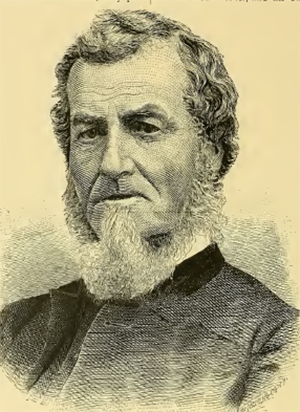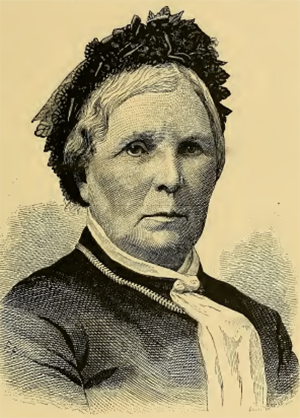Rev. W. B. Chidlaw

Rev. W. B. Chidlaw A. M., was born in Bala, North Wales, Great Britain, July 14, 1811. His paternal ancestors were Huguenots, who, in the persecution which followed the revocation of the edict of Nantes, in 1685, fled from France and found refuge among the mountains of Wales. His parents were Benjamin and Mary Chidlaw. They emigrated to the United States in 1821. Their voyage in the ship Manhattan, from Liverpool to New York, occupied forty-seven days. From New York they reached Albany in a sloop, on the Hudson, in a week; thence in wagons to Schenectady, and up the Mohawk river in a keel-boat to Utica. After remaining here a few weeks with some Welsh friends, they proceeded in wagons to Black Rock (now Buffalo), and on the "Walk-in the-water," the first steamboat that plowed the waters of Lake Erie, they voyaged to Lower Sandusky. After waiting here for transportation for several days, a wagon was secured to take the family - parents, a daughter and son - to Delaware, Ohio, where several of the neighbors in Wales had settled some years before. In a few weeks the father, stricken by fever, died. In 1822, his mother, a noble Christian woman, energetic and capable, bought a tract of land in the Welsh settlement of Radna, a few miles from Delaware. Here, in a log cabin home, the fatherless boy spent his early years, acquiring habits of industry and skill in the use of the axe, the hoe, and the sickle. In Wales he had been taught in the Sunday-school of the Congregational church of his native village to read, revere, and believe the Holy Scriptures, in his vernacular. In 1823, in the log schoolhouse of the settlement, with Webster's spelling book, for which he bartered four pounds of butter, he commenced his English education. Engaged in labor during the summer, and attending school in winter, he mastered Webster's spelling book, read the Columbian Orator, and grappled with Pike's arithmetic. In 1826 he attended the school of Bishop Chase, at Worthington, and one term of Kenyon college, the first after the institution, was removed to Gambler, Ohio, in 1827. In 1829 he united with the Presbyterian church, worshipping in a log chapel five miles from his mother's home. The same year he taught school in the settlement, receiving nine dollars a month salary, and his board in the hospitable cabins of his employees Encouraged by the religious people in the settlement, and anxious to be useful, he organized a Sunday-school in the log meeting-house, which became a decided success. This service in his early religious life, with the deep convictions of his own mind, led him to consecrate his life to the work of the gospel ministry. Aided to the extent of the resources of his widowed mother, and his own earnings by manual labor and teaching, he graduated in the Miami university, Oxford, Ohio, in 1833. He studied theology as a resident graduate with six other students, under Dr. R. H. Bishop, Professors McGuffey, Armstrong and Scott, the able faculty of the university. Like many others of his worthy fellow-students, sacrifices were made to obtain an education. Compelled to a rigid economy during his course of training for the work of life, he boarded himself at thirty-eight cents a week during the winter terms. He bought corn meal at ten cents a bushel, potatoes the same price, and beef at one cent and a half a pound, choice cuts. Raw material at these prices, and, being his own cook, he lived comfortably, enjoyed good health and great facilities for study.
In 1835 he was licensed to preach by the presbytery of Oxford, and accepted a call to the Welsh settlement of Paddy's Run, Butler county, Ohio, preaching in the Welsh and English languages. Organizing Sunday-schools and preaching outside the bounds of his congregation, his labors were blessed in the furtherance of the gospel, as well as in his own special charge. In 1839, invited by an aged and wealthy uncle in Wales, with his venerable mother, he visited the land of his birth. During this visit he travelled extensively over the Principality, preached in over a hundred chapels, witnessing wonderful revivals of religion. In one congregation, Llanuwchllyn, near Bala, his native town, over two hundred souls were converted and added to the church. On his return, in 1840, he entered the service of the American Sunday-school union, as its superintending missionary for Ohio and Indiana, in which he has continued until the present, except during the war of the Rebellion, when he was chaplain of the Thirty-ninth Ohio volunteer infantry, Colonel John Grosbeck's regiment, and in the service of the United States' Christian commission. In his regiment he was a good Samaritan and true evangelist, caring faithfully for the souls and the bodies of the brave men for whose good he served God and his country. His daily religious service, reading the scriptures and prayer in the presence of the regiment at dress-parade, his Sunday-school and preaching, as well as pastoral labors in the tent or barracks, the soldiers always appreciated and enjoyed. At Camp Benton, near St. Louis, in the autumn of 1861, when ten regiments were en-camped, Colonel Curtis commanding, invited him to preach on the of fasting and appointed by President Lincoln. the presence of this large body of troops and their officers, he discoursed on "the conditions of Divine deliverance in times of national peril," founded on Second Chronicles 7.14. In the hospitals of Perryville, Kentucky, Nashville, Millikin's Bend, Muffreesborough, Stevenson and Chattanooga, his labors of love in behalf of the Christian conversion were abundant and useful, a true friend and a willing helper to the sick, the wounded and the dying soldiers.
In 1863 Governor Brough appointed him trustee of the Miami university, an office he still holds. In 1866 he was appointed by Governor J. D. Cox trustee of the Ohio Reform Farm school for boys, at Lancaster. Re-appointed by Governors Hayes and Bishop, he served the commonwealth faithfully for fourteen years. In 1880 he was appointed by the American Sabbath-school union to represent the National society at the Raikes Sunday-school centennial memorial services, held in London, when over five hundred delegates, representing fourteen Christian nations, assembled to celebrate the first century of Sunday-school history. Before returning home he spent two months among the mountains of his native Wales, delighted by the cordial welcome and genial fellowship of old and new friends, participating in various religious services, and enjoying life on the sea shore and climbing the grand old rock-ribbed mountains.
Now, in sight of the seventieth milestone in life's journey, he enjoys good health and vigor, and is fully devoted to his chosen work, connected with the interest of religion and the early Christian education of our youth.

In 1842 he married Miss Rebecca, youngest daughter of Ezekiel and Mary Hughes. They were blessed with eight children. Henry Kerr, the youngest, died in 1862, and the eldest, Martha, who married John Karr, died in 1873, leaving seven children, Martha, Jane, Rosa, John, Benjamin C., Charles and Mary C. John Chidlaw, their eldest son, married Miss Harriet Hayes. They have four children - Edward H., Rebecca C., Martha and Walter. Benjamin, their second son, married Lucretia T. Matson, and have one son - William M. Chidlaw, James H., their youngest living son, married Miss Elizabeth Tanney. They had three children --Harry, Ida and Grace. They have three daughters Mary Irene, Anna and Jane Carter - unmarried and at home, cheering and blessing the declining years of their earthly pilgrimage with ministrations of love and kindness. The family residence of Mr. Chidlaw is on a large and valuable farm on the banks of the Miami. The old mansion is in a beautiful grove of forest trees, and is surrounded by the homes of his three sons, who are cultivating the farm with industry, enterprise and skill. As the shadows of the eventide of a long and useful life are gently falling on their pathway, they wait in hope for the hour of departure from the labors and joys of life to the rest and glory of the life eternal.
From History of Hamilton county, Ohio, Henry & Kate Ford, L. A. Williams & Co., Publishers, 1881

